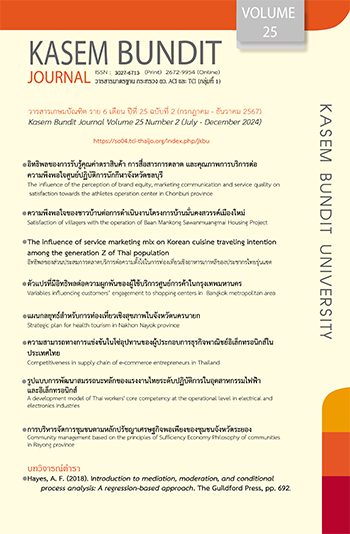Community management based on the principles of Sufficiency Economy Philosophy of communities in Rayong province
คำสำคัญ:
Community management, community, Sufficiency Economyบทคัดย่อ
PORPOSES: To study and analyze people’s lifestyles in communities in Rayong province in the framework the Philosophy of Sufficiency Economy as well as to offer guidelines to manage the communities based on the Philosophy. Also, the study attempted to bring to light a sustainable community model. METHODS: This research was qualitative research by means of interviews and participatory observation. RESULTS: It was revealed that people in three Rayong communities had a profound understanding of the Philosophy of Sufficiency Economy and employed the notion of being a strong community to lead their families. THEORETICAL/POLICY IMPLICATIONS: Community management in accordance with the Philosophy of Sufficiency Economy and management of community activities provided opportunities for all villagers to participate in community operations. This is consistent with the principles of leadership and leadership management that must exercise authority to command results. Applications of the principle of democratic leadership by listening to the opinions of every resident can result in successful community management as guided by the Philosophy of Sufficiency Economy.
เอกสารอ้างอิง
Atthmana, S. (2545). Organizational behavior: Theories and teenagers in behavior modification (3rd ed.). Thammasat Printing House.
Edward. J. B., Chen, K. H., & Lin, T. (2005). Cost management: A strategic emphasis. (3rd ed.). McGraw-Hill Irwin.
Wasi, P. (2541). On the new road of health promotion; Life and society. Moh-Chao-Ban Publishing House.
Royal Institute. (2554). Dictionary Royal Institute (Edition 2001). Aksorn Charoentat.
The Office of the Royal Development Projects Board (ORDPB). (2555). Sufficiency Economy Philosophy points to a way of life (5th ed.). Bangphlat.
ดาวน์โหลด
เผยแพร่แล้ว
รูปแบบการอ้างอิง
ฉบับ
ประเภทบทความ
สัญญาอนุญาต
ลิขสิทธิ์ (c) 2024 วารสารเกษมบัณฑิต

อนุญาตภายใต้เงื่อนไข Creative Commons Attribution-NonCommercial-NoDerivatives 4.0 International License.
Any views or opinions expressed in this issue of the Kasem Bundit University Journal are those of the authors alone and do not necessarily reflect the views or opinions of Kasem Bundit University or the editors.







